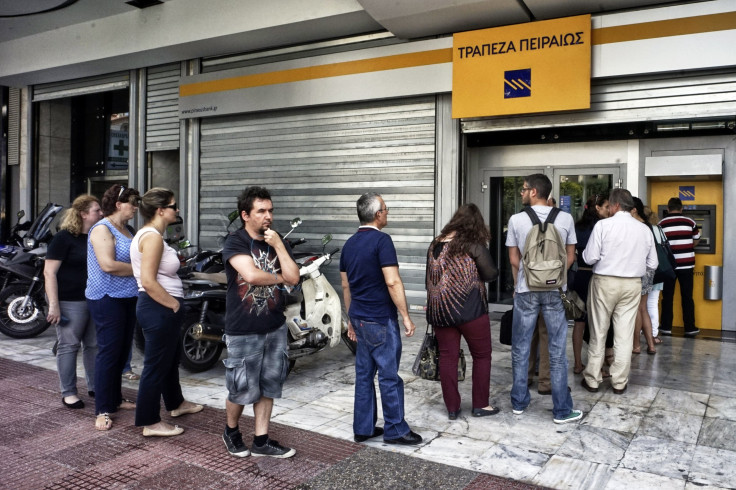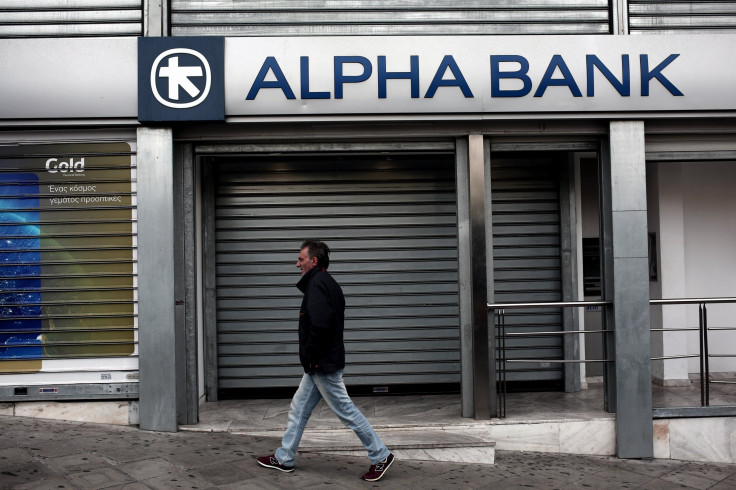Greek Banking Crisis 2015 Update: What Will Recapitalization Mean For Average Greeks?

The four leading banks in Greece are expected Friday to lay out their plan for recapitalization, less than four months after the debt-stricken nation's financial institutions reopened following a near-collapse in July. The long-awaited recapitalization process, however, which is likely to include a mix of private investment and bailout money from eurozone lenders, is not an instant solution for average citizens suffering under continued debt.
Greater liquidity and more stability in the long term will follow from the recapitalization, according to economists, as the short-term outlook for average Greeks remains bleak. Average Greek citizens and local businesses will continue to live under strict capital controls, such as account withdrawal limits, as growth in the cash-strapped country stalls and faith in the ruling government wanes.
“The growth issue is a big question mark,” said Marco Vicenzino, director of the Global Strategy Project, a geopolitical risk and international business advisory firm. Vicenzino described Greek citizens worrying about how recapitalization will affect daily activities, such as whether families can provide necessities or if small businesses will be able to pay their employees. Many Greeks are not optimistic, according to Vicenzino: “Most people don’t see the light at the end of the tunnel.”
Recapitalization is expected after a European Central Bank identified a $15.9 billion hole in the Greek banking system. The process works by restructuring assets, in this case to become more liquid, by using a combination of private investment and government-approved bailout funds. The process' goal is to pump money back into a cash-poor system.

Greece has struggled to recover from a 2008 recession that sank the euro and kept unemployment in the double digits while the national deficit soared. After multiple bailouts from European lenders that exchanged cash for austerity measures, such as slashed social spending and higher taxes, the Greek banking system was still on the verge of collapse when the top banks shut their doors in June.
By running on an anti-austerity platform that denounced measures such as budget slashing and capital controls, Prime Minister Alexis Tsipras and his Syriza Party first rose to power in January, vowing to stand up to European lenders. Syriza capitalized on the number of Greek citizens who were frustrated with the terms laid out by the lenders, saying they made daily life impossible.
After Tsipras resigned in August, however, amid splintering within his own party, Greeks began to lose faith in the power of Syriza to make radical change in the status quo. Though Tsipras returned to power in a snap election in September, his style of governance has been much more muted, and he's resigned to following the reforms stipulated by the latest bailout package.
The upcoming reforms stipulated by the third bailout will involve pension and income tax reform, among others, though the exact details have yet to be articulated. “The real impact of the third bailout has yet to be fully felt,” Vicenzino said, adding: “Already it’s not good at all. Ordinary Greek people have very little if any faith left.”
And the capital controls will likely not be immediately lifted following recapitalization, experts said. “For the time being, it wouldn’t surprise me if they prolonged the capital controls,” said Willem Pieter De Groen, a researcher specializing in economics at the Center for European Policy Studies, a think tank based in Belgium. He noted that the banks will need to ensure their long-term stability before loosening these controls. “You need to have a certain confidence that there won’t be a further outflow of funds,” De Groen said.

For average Greek citizens, this will likely mean continuing checking and pension withdrawal limits, as well as dealing with a spate of already-agreed-upon reforms, including changes to the pension system and the housing market.
With spending limited and debt still high, liquidity won’t mean Greek citizens will suddenly be able to go out and make big purchases. Recapitalization also won’t mean immediate growth for the Greek economy, as its primary goal is to stabilize the banking system so that it will be able to weather a future crisis.
“Eventually the banks will be free to give out credits to the market, and the economy will start moving again,” said Angelos Chryssogelos, a postdoctoral fellow at the Hellenic Observatory of the London School of Economics. “But even if that is the case, it will still be a case of long-term stability producing benefits with the cost of immediate pain.”
In the long term, however, the recapitalization will be good for everyone, according to Chryssogelos, though the effects won’t be immediate. “It is in everyone’s interest -- the Greek government, the eurozone, the Greek people -- to get along with this,” he said, explaining how it is a way of protecting assets in an effort to lay the groundwork for future growth.

If the Greek banks come up with a plan that is accepted by the European lenders, the recapitalization will likely take place before 2016.
Reforms to take place in 2016, including for pensions and income taxes, may outweigh any positive effects felt by Greeks following the recapitalization, experts said. “It’s going to take time, and it’s going to be very, very political,” said Mujtaba Rahman, a London-based director for the EurAsia group, a political risk consultancy firm.
Blowback from the reforms will also continue to sink the public’s faith in its government, he said. "It’s not going to play well with public opinion,” Rahman said, adding that when it comes to reforms, “I don’t think the public understands what they were signing up for, and the government didn’t either.”
© Copyright IBTimes 2024. All rights reserved.





















